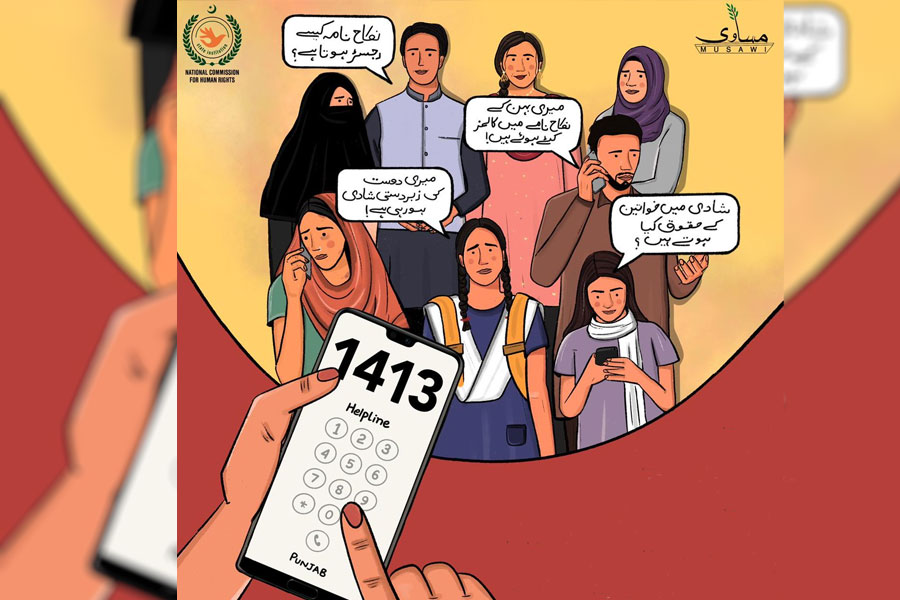The National Commission for Human Rights (NCHR) Punjab has collaborated with a research organisation to establish a toll-free helpline for the protection of women’s marriage rights in the province.
The toll-free helpline ‘1413’ was established after a pilot study was conducted in Musawi through which it was found that 60% of marriage registrars do not consider the consent of the girl in a marriage contract important.
The helpline was launched at the NCHR office on Tuesday. On the occasion, Rabia Javeri Agha, Chairperson of the National Commission on Human Rights (NCHR) said, “Nikah is a legal document which has got a religious tone”.
Moreover, if a Nikah Khawan does not fill every column of the Nikahnama, action should be taken against him, said Nadeem Ashraf, Member of Punjab NCHR.
Toll-Free Helpline ‘1413’ for Women’s Marriage Rights
The helpline ‘1413’ will be operational from Monday to Friday from 9am to 5pm and will provide access to those who wish to inquire about Nikahnama and its clauses, and legal advice related to marriage rights as protected under the laws of Punjab, Pakistan.
Any calls received after business hours will be recorded, and the helpline officers will contact the individual who has initiated an inquiry as soon as possible.
Moreover, the aim of this helpline is to improve the quality of legal advice and representation of women, especially for the underprivileged and illiterate women that have mobility constraints or little to no access to penetrate their marriage rights.
The helpline is now operational to support individuals across Punjab from 9:00am-5:00pm Monday – Friday on marriage rights related matters. Any calls received after business hours will be recorded so our helpline officers can contact you as soon as possible.
— Musawi (@musawiofficial) January 24, 2023
There’s An All-Women Ambulance Service in Pakistan You Should Know About
Importance of Protecting Women’s Marriage Rights
Protecting women’s marriage rights is important because it ensures that women have equal rights and opportunities in marriage and are not subject to discrimination or mistreatment.
This includes the right to choose one’s own spouse, the right to enter into and exit a marriage freely and without coercion, and the right to equal treatment and protection under the law during and after the marriage.
Additionally, protecting women’s marriage rights can also help to reduce the incidence of domestic violence and abuse, as well as promote gender equality and empowerment.
In Pakistan, women’s marriage rights have been a topic of much debate and controversy. Historically, women have faced discrimination and unequal treatment under the law in matters related to marriage, including forced marriages, marital rape, and lack of inheritance rights.
The legal age of marriage for women in Pakistan was 16, but with the consent of their guardians, it was as low as 12. In 2019, a bill introduced by Pakistani senator, Sherry Rehman, was passed in the Pakistani Senate to increase the minimum age of marriage for females to 18.
However, in practice, child marriage is still common in many rural areas. The practice of forced marriage, in which women are married against their will, is also prevalent in Pakistan.
In addition, the laws related to marriage and divorce in Pakistan are based on Islamic laws, which can be discriminatory towards women.
For example, under the Muslim Family Laws Ordinance, a man can divorce his wife without giving any reason, while a woman can only seek divorce on certain grounds and with the approval of the court.
Efforts have been made in recent years to address these issues and improve women’s marriage rights in Pakistan. For example, the Prevention of Anti-Women Practices (Criminal Law Amendment) Act was passed in 2011, which criminalized forced marriage and made it punishable by up to 5 years in prison. However, more work needs to be done to ensure that women have equal rights and protections in marriage.
